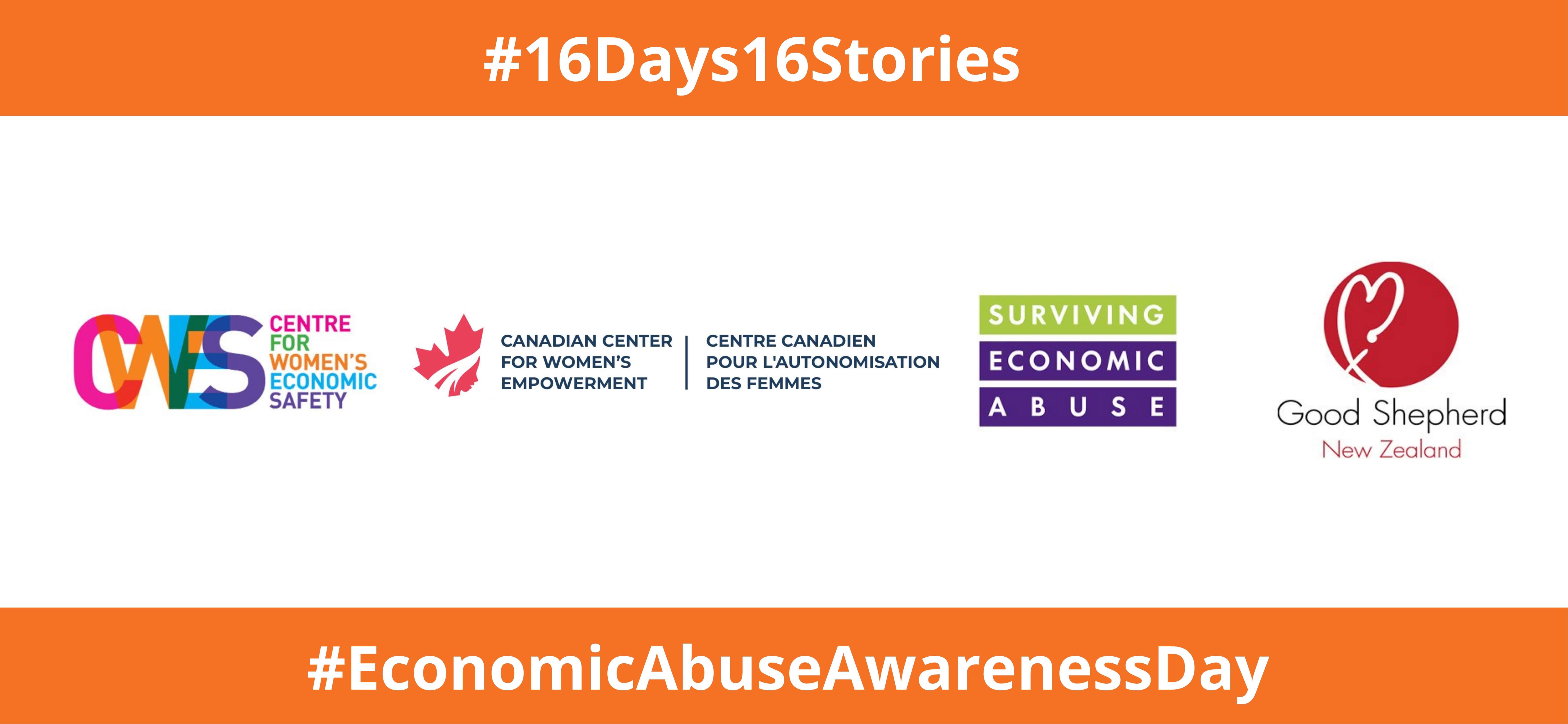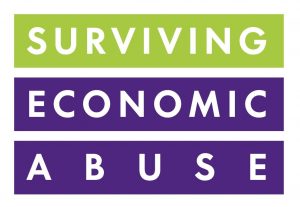An International Collaboration to End Economic Abuse and Global Response
The 16 days of Activism Campaign is an international campaign that lasts for 16 days between November 25th – International Day for Elimination of Violence against Women, and December 10th – Human Rights day. The campaign raises awareness about local, national, and international gender-based violence.
CCFWE, in collaboration with our global partners in Australia (Centre for Women’s Economic Safety – CWES), New Zealand (Good Shepherd), UK’s Surviving Economic Abuse (SEA), Institute for Social Development and Justice (South Africa), and Women’s Spirit (Israel) raised awareness and explore how we can transform responses to Economic Abuse worldwide.
International Response to Economic Abuse: To mark this year’s IEAAD, the coalition released “Making a Difference: International Responses to Economic Abuse.” The report provides insights into developments across six countries since the beginning of 2021 to support change-makers and leaders in their efforts to tackle Economic Abuse. Read the report here

Violence is not always physical, though. This year, the Canadian Center for Women’s Empowerment will highlight 16 stories of Economic Abuse survivors in four nations: Canada, Australia, New Zealand, and the United Kingdom to recognize International Economic Abuse Awareness Day, November 26.
The women featured share their journeys of the barriers and social taboos they faced, not only to make their voices heard but to push others to challenge the status quo and speak up.

United Kingdom – Surviving Economic Abuse
Surviving Economic Abuse (SEA) is the only UK charity dedicated to raising awareness of economic abuse and transforming responses to it. The charity works day in, day out to ensure that women are supported not only to survive, but also to thrive. Many women experience economic abuse within the context of intimate partner violence. It limits their choices and ability to access safety. SEA’s vision is a world in which all women and girls achieve economic equality and can live their lives free of abuse and exploitation.

Australia – Centre for Women’s Economic Safety
The Centre for Women’s Economic Safety (CWES) exists to raise awareness and understanding of intimate partner economic abuse and to advocate for social and systemic changes that support women’s economic safety and opportunity.

New Zealand – Good Shepherd New Zealand
Good Shepherd NZ is a charitable non-government organisation that was established to address the critical, contemporary issues facing women, girls and families.
Good Shepherd has been supporting better futures for women, girls and families experiencing disadvantage in New Zealand for 130 years, led by the Good Shepherd Sisters. Good Shepherd NZ was established in 2012 to continue the Sisters’ work.
 Canada
Canada
I am an Indigenous woman who has lived in Ottawa for almost 7 years. I was married to my now ex-husband for almost 30 years. I used to have a promising career, but my husband forced me to leave my job. I was prevented from earning my own income and was abused mentally, psychologically, and financially for the entirety of the marriage. At the time, I did not identify this as abuse as my husband never physically touched me. After our divorce, the legal arrangements granted him the house and vehicles. I was left with thousands of dollars of credit card debt that accumulated mainly due to his purchases. Early after the divorce, credit card companies and banks continually called to collect on these debts when my ex-husband was unreachable. During this time, I was entitled to spousal support and the Ontario Disability Support Program (ODSP), however, my ex-husband would provide just enough in monthly payments to disqualify me from ODSP. These payments, however, did not provide enough to meet needs for disability payments, transportation costs, housing costs, and food that met dietary needs resulting from years of abuse. This abuse has exacerbated depression that I have had since my late teens and created significant anxiety for the past 7 years. I am currently living at a location unknown to my ex-husband as he remains a threat to this day.
“I lived with my now ex-husband for 10 years. After the birth of our child, his tendencies of financial control worsened. I was deprived of necessities for myself and my baby. He would force me to work long hours all while never contributing to the household. From the beginning, he had not been a responsible individual. He would not pay bills, wasn’t allowed to drive a car, relied on his family business, and would take advantage of me. He forced me to take out credit and purchase a house. He used my credit card for his business. He refused to pay any of the expenses. This meant that I wasn’t able to get the things that I needed as I would not have enough money. If I asked him for money, he wouldn’t let me have any since I had already spent my grocery money allotment. I also experienced a significant amount of violent trauma. This resulted in medical complications and admissions to hospitals for multiple surgeries. It got to a point where my doctors advised me not to work at that time due to my anxiety and surgeries. Finally, I left him with credit. He had taken everything, which meant I had to spend a lot of money on household essentials to start again. At this point, I didn’t have access to legal support to fix my credit, freeze my assets or access justice. For instance, I was denied social housing due to my husband’s property and I was denied a student loan due to my bad credit. My bank didn’t allow me to arrange payments on my mortgage while I was in transition housing. They were exposing my personal information to my ex husband while I was hiding in transition housing. This was problematic since we had a joint mortgage, and as the breadwinner, the payments were taken out of my accounts, not his. I also was unable to receive social support from the government due to changing provinces. I remember one day, I had no milk in my fridge and went to the food bank to feed my child. The food bank asked me to provide income verification from the government. At this point I had no money, no income verification, no social support, and not even food from a food bank. It was very hard to start a life for me and my child. These experiences resulted in significant mental health trauma, but it took two years to see a therapist. It was a very heartbreaking journey to recover from all these traumas. Even though I left him 7 years ago, the impact of financial abuse is still massive. I am still overwhelmed by the debt my abuser/ex-husband created and left me with.
I moved to Canada two years ago and English is my second language. I don’t have any family or friends in Canada. My husband, however, has lived in Canada for more than 20 years. He would frequently yell and hit me during our marriage. When I was working a cleaning job, my husband did not allow me to use my salary that I earned, even for my basic needs like menstrual pads. It was difficult to find money to pay for my bus ticket for travel to my workplace.. He also forced me to sign up for three credit cards under my name. My financial literacy knowledge was very limited then and I did not know the consequences of taking out numerous cards. I remember feeling broken and frustrated. I decided to go back to my family, but he prevented me from buying a plane ticket home. Later, during the first wave of the pandemic, I got pregnant. It was a very frustrating time in my life. There was nowhere I could go or anyone I could talk to due to the language barrier. Through my church pastor, I was able to go to a women’s shelter and leave my abuser. I was also connected with the CCFWE support group. It was a safe haven to breathe and learn more about abuse. Prior to the support group, I had never heard about domestic violence in my country. It was eye opening and taught me how to protect my finances and future.
“I am a mother of two children, and am living in Ottawa. The physical violence started during COVID-19. My husband was physically, psychologically, and financially abusive towards me. He would often hit me and despite earning my own income, he would prevent me from saving my own money, often spending it himself. My husband often used religion to justify his spending and overlooked my needs. Once, a court had mandated my husband to anger management, and after conversations with the other men in the class, my husband returned with more discrete methods to physically abuse. He abused our joint financial accounts when he had an affair by taking all of my money out of our joint account, effectively leaving me penniless. I have a disability and my children have special needs and I struggle everyday to provide basic needs for my children and myself. I was able not to leave the abusive situation and move into separate premises from her husband. Every day is difficult, as both my children, and myself have food allergies, and the cost for the food myfamily can eat is exorbitantly high. I’m trying to secure a home, but I have to pay a high deposit to move in. I left everything behind for him”
 United Kingdom
United Kingdom
“I was the main earner and was punished if he could not have what he wanted and expected, like expensive clothes, high range cars. If I said we cannot afford it he would comment, ‘what have you spent my money on?”
“From initially telling me what a kind, generous, attractive, thoughtful person I was it deteriorated into constant humiliation of how ugly I was, that I was going mad, that I made things up, that no one would believe me etc. On the first wedding anniversary he physically attacked me for the first time. I was very badly beaten with extensive bruising apart from on my face. He strangled me a few months later for daring to ask where he had been. From this point I knew what he was capable of. He made threats to set fire to the house with my daughter inside if I did not comply or if I went to the police. He used my daughters as the weapon to continuously control and silence me. As a mother you will do anything to protect your children. He would forever play mind games with me- when I cooked dinner, he sometimes swiped it off the table because it wasn’t what he wanted or it was what he had asked for but I had taken too long cooking it or regularly, as I put it on the table he would go and make a very long phone call to his family and then come back and tell me it was cold.
After a year of marriage he left his job and went to night school and trained to become a handy man. He had 14 jobs in 14 years of marriage – forever changing his job or not being in work but refusing to look for work or seek benefits. He continued to live as if he was on a high salary. I was the main earner and was punished if he could not have what he wanted and expected e.g. expensive clothes, high range cars. If I said we cannot afford it he would comment, ‘what have you spent my money on?’ When I became seriously ill he appeared as a caring and loving husband. In reality he never attended any hospital appointments with me, repeatedly sang into my face that he was going to get £100,000 death in service payment in a few months, placed water and medication out of my reach, and on discharge after major surgery told my children he was looking after me, (I was not mobile), so they didn’t need to come round and then left me on my own for 2 days and took the phones. The physical, emotional and psychological abuse increased immensely whilst I was so ill. The financial abuse was also escalating but I was not aware of this at the time.”
“Unfortunately, at the end of last year I received a ‘standard’ letter from the bank explaining about changes in interest rates. It was addressed to both myself and my ex-husband and it had both our addresses on it. I was horrified. I immediately telephoned the bank who told me it was only a standard letter and nothing to be concerned about. I explained my situation, that I needed to be safe and that the joint account had been closed some 3 months previously – it had been frozen for 3 years prior to that and keeping my address safe was paramount. I was told that standard letters are prepared months in advance and there was nothing they could do. The bank said I had to just phone the police. Obviously, I had done that already. I packed there and then relocated several hundred miles away”.
“Money doesn’t make you happy but without money there’s nowhere to go. And that’s why for me, economic abuse is the greatest form of control. Economic abuse can have lifelong effects.”
“It started more or less straight way – there was physical abuse, sexual abuse and, I didn’t know what it was called at the time, but economic abuse. I had a baby very quickly and he took it upon himself to go to the register, while I was in hospital, so he could claim child benefit. He did the same thing every single time when our other children were born. I had no access to any money at all, even to buy very personal items. I was working at the time and when my first child was born I went to go back to work and he used to walk out instead of minding her and eventually I lost my job. I did try to get another job after that because I didn’t want to live off benefits, that wasn’t part of my plan for life but he began to claim benefits for us all then, including income support and sickness benefit. The children didn’t see any of that money.
“It’s really difficult to describe. To be so powerless. I can’t explain what it’s like, it’s overwhelming. You start to go through periods of depression. Not being able to provide for your children, relying on someone else. Even buying stuff like sanitary towels or things like food. He event bought himself different food to myself and the kids. He’d buy himself a steak or whatever, and he’d buy a tray of mince for me and the kids and I’d have to divide that into 4. Sometimes we’d have to survive on eggs because that’s just what he brought in. You have absolutely no control of your life. It’s just horrendous, it’s awful.”
“It just wasn’t the done thing to talk about or maybe it was just the accepted thing – that he was the man and has control. It’s disempowering.
“Even though the relationship ended, that doesn’t mean the economic abuse is over. He continues to withhold the child maintenance payments from me that I am entitled to – it’s a form of control. He owes me tens of thousands of pounds but I still haven’t seen this money.”
“Economic abuse is one of the biggest forms of control and it’s had lasting consequences for us. Money doesn’t make you happy but without money there’s nowhere to go. And that’s why for me, economic abuse is the greatest form of control. Economic abuse can have lifelong effects.”
“He refused to work, so I worked while he controlled all the money. My personal financial situation was strong before I met him, but he constantly increased overdrafts, opened new bank accounts, destroyed my debit cards, opened credit cards and mobile phone contracts, and applied for loans in my name.”
The years of abuse broke me. I felt worthless, I didn’t feel like a person, I was just a part of him. I considered suicide as the only escape until I was referred to a domestic abuse organisation for support. I’m still on antidepressants and have had regular counselling for the last two years. Physically, I still operate in fight or flight mode, meaning I’m constantly on edge and my body doesn’t cope well with adrenaline and stress. Financially, I feel stuck. My credit rating is very poor because of the huge debts my ex-husband left in my name.
He refused to work, so I worked while he controlled all the money. My personal financial situation was strong before I met him, but he constantly increased overdrafts, opened new bank accounts, destroyed my debit cards, opened credit cards and mobile phone contracts, and applied for loans in my name. By the time our relationship ended, there were four credit cards with a total balance of £10,000, two loans with a balance of £15,000 and two current accounts overdrawn by £2,000. He also took £5,000 from our children’s bank accounts and racked up £700 in water charges in the space of six weeks while the children and I were away from the house, and in excess of £3,000 gas and electric in less than a year, while I was working.
It was my house and because I had no money and three children, I had nowhere to go. I couldn’t afford to run to another property. I was constantly scared he would trash the house or burn it down. I knew he wouldn’t leave. Rent was more than any mortgage and I couldn’t get another mortgage due to my poor credit rating. I was stuck. Social housing wasn’t an option because I owned my property. At the time, I didn’t think refuge was an option either because I didn’t fully understand how abusive he was being.
He refused to work, so I worked while he controlled all the money. My personal financial situation was strong before I met him, but he constantly increased overdrafts, opened new bank accounts, destroyed my debit cards, opened credit cards and mobile phone contracts, and applied for loans in my name.
“He kept saying how bad I was with money and it knocked my confidence. Although I was earning a lot, I never felt it was mine. He kept increasing how much I needed to pay into the joint account; there were always good reasons, so I didn’t question it.”
“Tom** and I met when we were 17 and were friends for several years before we got together. I was attracted to him because he came across as caring and emotionally open. When we moved in together, we talked about money; he suggested we have a joint account for rent and bills and to split everything 50/50. That seemed reasonable, so I agreed.
Within a few years I was head of department in a school, working 50-hour weeks. Tom had a job at a university and he took over managing our finances; my work life was so busy, it made sense at the time. Gradually, his behaviour started to change and he became angry and aggressive.
He kept saying how bad I was with money and it knocked my confidence. Although I was earning a lot, I never felt it was mine. He kept increasing how much I needed to pay into the joint account; there were always good reasons, so I didn’t question it. Things came to a head when I’d saved up enough to buy a property and he had no interest in buying with me. I tried to end the relationship then, but his sister died and he persuaded me to let him stay in my home.
He then insisted that I get out of my five-year fixed rate mortgage, even though my mortgage broker said it wasn’t a good idea. Tom wore me down; I was too tired to fight. He said we should change the deeds at the same time to include him in them. I didn’t fully understand what a big deal that was and what I was handing over.
When I ended our relationship two months later, he told me I “deserved to be punished”. We ended up in a legal battle that lasted two-and-a-half years. Because he was on the deeds, he claimed he had an entitlement to the property.
I tried to say that he was abusive and he’d coerced me into doing things I didn’t want to, but I had to pay him £15,000 to remove his name from the deeds. It was only after we split that I realised he’d also been taking money from the joint account. Afterwards, I suffered from PTSD: I stopped eating and sleeping, and I had to leave my job due to the stress. Now, I’m slowly rebuilding my life. I still have the house and I’ve launched a personal training business. I’m also passionate about raising awareness about domestic abuse. It can happen to anyone and I’m proof of that.”
 New Zealand
New Zealand
“I was the main earner and was punished if he could not have what he wanted and expected, like expensive clothes, high range cars. If I said we cannot afford it he would comment, ‘what have you spent my money on?”
Sarah owned a business with her husband, and he manipulated their situation to cause economic and psychological harm, including turning staff against her.
When she hired a family lawyer to represent her in Court, the lawyer advised her to ‘drop it’ because it wasn’t worth it.
Sarah finally worked up the courage to ask for help, but felt like an imposter because she hadn’t been physically harmed.
“But then there was the sick realisation of sitting in the room and realising I do belong here.”
Even though they have separated, he still controls Sarah financially, but she is beginning to see a future.
“It takes a long time to re-programme yourself. I still struggle massively with compliments, but I’m getting some self-belief back and self-worth.”
Click here to read more:
Perspective: experiencing economic harm – Good Shepherd NZ
Proposed hashtags
#16days16stories
#InternationalEconomicAbuseAwarenessDay
#EconomicHarmAwareness
“You are already struggling and then you end up fighting the system.”
June has experienced economic harm alongside other forms of abuse since she was a young girl, and systemic barriers made things worse.
When she was a young parent, changes to welfare payments made her difficult situation easier.
However it still wasn’t enough.
June’s desperation to pay the family’s bills led her to make decisions that would have long lasting consequences.
June is now rebuilding her life, and thanks to changes to the law she is able to remove some of those barriers.
Read June’s story about the challenges she has faced throughout her life and what challenges she’s had to overcome economic harm.
https://goodshepherd.org.nz/news-and-media/the-long-lasting-impact-of-economic-harm/
Proposed hashtags
#16days16stories
#InternationalEconomicAbuseAwarenessDay
#EconomicHarmAwareness
“I thought I could just love him and it would get better. And then the bills started coming.”
“I ended up with Baycorp, and the bills kept coming. I thought it was because I was bad with money because that’s what he’d told me.”
Paige met her partner at a party when she was 15.
Every Sunday they would run out of credit on their power account. Paige was desperate and would get loans to try to make ends meet, pay the overdue bills and give him money for his drugs so he wouldn’t be so angry.
“I ended up with a debt collector, but the bills kept coming. I thought it was because I was bad with money because that’s what he’d told me.”
Read Paige’s story of experience of economic harm and how she was able to overcome it.
https://goodshepherd.org.nz/news-and-media/i-thought-i-was-bad-with-money/
Proposed hashtags
#16days16stories
#InternationalEconomicAbuseAwarenessDay
#EconomicHarmAwareness
“When we returned, he gave me a bill made up of all the money I owed him.”
At the beginning of her relationship, Lara was very happy and life was good.
As time went on, her partner Paul started chipping away at her confidence and Lara began second guessing herself.
“Paul treated me like a child. I could never do things right or good enough, which led to me hating myself.”
Sometimes Paul would help Lara out with money, which she thought was a favour – it turns out it wasn’t. He was keeping a tab of everything.
Lara shares her experience of economic harm and the impact it has had on her life.
https://goodshepherd.org.nz/news-and-media/be-proper-girlfriend/
Proposed hashtags
#16days16stories
#InternationalEconomicAbuseAwarenessDay
#EconomicHarmAwareness
 Australia
Australia
“I’d learned not to rely on anybody else so when [the nurse] put her hand out… It was like a drowning person getting thrown a lifeline.”
“Toby and I got together in the early 90s in NZ and divorced after we’d been together more than 20 years. After the divorce, [the abuse] still continued. To this day I get debt collectors and people following up with me about him…
After I left Toby, I moved to Australia and I had started to see this guy. I was very worried about pregnancy and STDs and all that kind of jazz because it’d been a thousand years since I’ve done any of that stuff. I went to family planning and the nurse said, “So we have to ask everybody, are you experiencing domestic abuse?” She was like, “I expect your answer is no, but you know, we have to ask.” And I said, “actually, I am.” At that stage, I’d had no contact with anybody except for HR and [Employment Assistance Program] back in England. And the nurse says to the receptionist, “You’re going to have to delay my appointments.”
That was so important to me. I think it was just the power of having somebody validate my experience having been completely shat on. You know, I’d learned not to rely on anybody else so when she put her hand out… It was like a drowning person getting thrown a lifeline.
The thing I loved about that particular nurse is that she didn’t feel like she had to fix everything on the spot and get me into a women’s refuge. She just went, “when you’re ready, call this number. Okay. Come back here anytime you need.” And she gave me a little leaflet that had the 1800-RESPECT number on it and they were amazing.”
URL for full story: https://cwes.org.au/melissa/
“One day, he removed my credit and debit card from my wallet before he left for work. He did it right in front of me. It was very overt. I had no income, and I thought, “how am I going to get money?”
“We were separated but we still lived under the same roof because I didn’t have anywhere else to live and I couldn’t afford to rent on my own. My second child wasn’t quite one year old, and I couldn’t get them into childcare. That meant I couldn’t work and had no income at all. One day, he removed my credit and debit card from my wallet before he left for work. He did it right in front of me. It was very overt, and I thought, how am I going to get money? I’ll have to go into the bank and ask.
I felt very trapped because I knew that the government couldn’t easily provide me with a parenting payment. I contacted Centrelink to find out what I would be eligible for and they said that it would take six weeks for me to get a single parent pension. And I said to them, “okay, so what happens if I need to get out of the house and I need some money to pay rent somewhere?” They said that they could offer like $500, and I was absolutely baffled. I thought, “how do people leave?” There must be so many women like me who are absolutely stuck.”
URL for full story: https://cwes.org.au/lainie/
“My application for Housing got put on hold and delayed because he made an anonymous allegation that I had money back home. So we ended up homeless. We had five different ‘homes’ in seven weeks.” Tara, Australia.
“It was an anonymous allegation, but we all knew who had made it. The woman at Housing even said, “your ex-husband has made these allegations,” and I said, “oh, you know who it was?” and she said “no, but it’s an anonymous allegation; who else would do it?” I had to go into the Housing office to make a statement and provide bank statements, to show the allegations were false.
When they couldn’t find any crisis accommodation for us, they put us in this little motel which wasn’t practical with two small kids. Then you have to go back to Housing every few days to be declared homeless again – that’s the process. When we went back, the lady at Housing said, “there’s still nothing available.” I said, “that’s not good enough. You have to find us somewhere.” She went away and she came back and said, “okay, we’ve found a place for you, to share with another woman, and you have to pay.” It was like $20 a day or something, which I’d have to pay out of my Centrelink income.”
URL for full story: https://cwes.org.au/tara/
“Once the domestic violence order was in place, he went and lived with friends and just refused to pay any of the bills.”
“He wouldn’t pay the electricity bill, the water bill, or the council rates. It was quite a big house. Thankfully the mortgage was still coming out of the joint account. The car rego was due, but the registration was in his name, and he was refusing to register it, so that was a whole debacle. We’d bought the car together and I was using it to get around with our baby, but it was registered in his name. I tried to do the rego myself, but I needed his licence number and so on. I was driving around with my baby son in an unregistered car, which was not good.”
URL for full story: https://cwes.org.au/laura/

